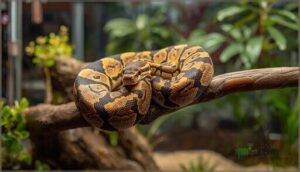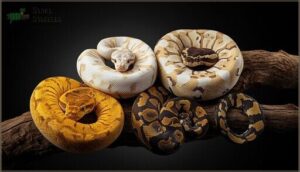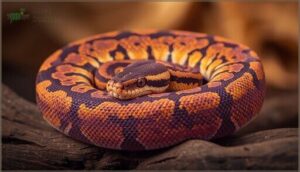This site is supported by our readers. We may earn a commission, at no cost to you, if you purchase through links.
You won’t find ball pythons at your local pet store with the same genetic diversity or health guarantees that established breeders provide. The difference between buying from a reputable breeder and a random source can mean years of veterinary headaches or a thriving snake that becomes a cornerstone of your collection.
With thousands of morph combinations flooding the market and prices ranging from $50 to over $10,000, knowing how to identify trustworthy ball python breeders saves you money and heartbreak.
The best breeders don’t just sell snakes—they provide genetic testing, multi-generational lineage data, and ongoing support that transforms first-time owners into confident keepers.
Table Of Contents
- Key Takeaways
- Choosing a Ball Python Breeder
- Top Ball Python Breeders in The US
- Comparing Ball Python Morphs for Sale
- Evaluating Breeder Practices and Animal Health
- Purchasing and Receiving Your Ball Python
- Preparing for Ball Python Ownership
- Frequently Asked Questions (FAQs)
- Where are pythons bred?
- Where can I find ball pythons for sale online?
- How much does a ball python cost?
- Do you sell baby ball pythons online?
- Where can I breed a ball python?
- Are ball pythons good pets?
- How much does a normal ball python cost?
- How much does a ball python breeder make?
- Is a male or female ball python better?
- What is the best breed of ball python?
- Conclusion
Key Takeaways
- Reputable ball python breeders provide genetic testing, multi-generational lineage data, and health guarantees covering congenital defects—not just animals—which separates them from pet stores and random sellers who lack transparent breeding practices and long-term support.
- Ball python morph prices range from $40 for standard varieties to over $10,000 for rare designer combinations, with pricing driven by genetic complexity, market saturation, breeder reputation, and the specific traits involved in multi-gene morphs.
- Captive-bred ball pythons consistently outperform wild-caught specimens in parasite load, acclimation stress, and feeding reliability, making them the ethical and practical choice for both animal welfare and owner success.
- Top U.S. breeders like Kinova Reptiles, CV Exotics, CB Reptiles, and XYZReptiles offer proven track records with 5-10+ years of experience, hatch success rates above 80%, and comprehensive customer support that extends well beyond the initial sale.
Choosing a Ball Python Breeder
Finding the right ball python breeder can feel overwhelming with so many options out there, but it doesn’t have to be. The best breeders share a few important qualities that set them apart from the rest.
Let’s look at what you should prioritize when choosing where to buy your new snake.
Key Qualities of Reputable Breeders
The best ball python breeders stand out through genetic testing, multi-generational lineage data, and solid health guarantees covering congenital defects. You’ll want breeders who prioritize preventative care—think routine vet checks and parasite screenings—while maintaining transparent ethical practices. Look for strong customer service, detailed record-keeping, and active community engagement.
Reputable breeders support ethical reptile ownership by providing after-sales guidance and documented husbandry standards. Some ball pythons can even reproduce through facultative parthenogenesis.
Breeder Reputation and Experience
Experience really counts in this hobby. Reputable breeders with 5–10 years under their belts generally deliver hatch success rates above 80% and show solid genetic transparency in their pairings.
You can gauge breeder longevity and ethical breeding through customer reviews on MorphMarket—look for patterns of repeat buyers and detailed feedback. Strong customer service and breeder reputation go hand in hand with proven track records.
Researching breeders’ reputations is essential, so look for those with trusted breeder status.
Customer Service and Support
A proven track record means little if your breeder goes silent after the sale. About 70% of breeders respond to inquiries within 24 hours, but the best ones offer genuine after-sale engagement—answering feeding questions, troubleshooting setup issues, and providing technical support when you need it.
The best breeders don’t disappear after the sale—they answer your questions, troubleshoot problems, and stay engaged when you need help
Check reviews for complaint resolution stories and ask about their communication platforms upfront. Strong customer service separates hobbyists from professionals.
Top Ball Python Breeders in The US
Finding the right breeder can feel overwhelming when you’re staring at hundreds of listings online. The good news is that a handful of established U.S. breeders have built solid reputations for healthy animals, diverse morphs, and reliable customer support.
Let’s look at four standouts that consistently earn trust in the ball python community.
Kinova Breeder Overview
When you’re ready to work with one of the true pioneers in the game, Kinova Reptiles stands out. Based in Gainesville, Georgia, this operation produces around 1,500 captive-bred ball pythons annually—making them among the largest designer-morph breeders in the US.
With over 20 years of selective breeding experience, Kinova’s reputation for morph artistry is unmatched, especially at major expos like Tinley Park.
CV Exotics Breeder Overview
If you’re looking for a family-run operation with a personal touch, CV Exotics in East Hampstead, New Hampshire, delivers solid breeding ethics and consistent morph availability.
As one of the more accessible professional breeders in the Northeast, they balance business practices with customer service—making them a reliable choice among ball python breeders and reptile breeders generally.
Customer reviews often highlight their responsiveness and transparent facility overview.
CB Reptiles Breeder Overview
CB Reptiles operates out of Galloway, New Jersey, as a family-owned business focused on morph quality and genetic diversity.
Ball python breeders here prioritize captive bred reptiles with transparent breeding practices and strong animal welfare standards.
Their business reputation among reptile breeders reflects consistent customer support and reliable breeding ball pythons across multiple morphs.
You’ll find they maintain professional standards while keeping the experience straightforward and accessible for buyers at any level.
XYZReptiles Breeder Overview
XYZReptiles brings over 35 years of combined experience from their Palmetto Bay, Florida facility, where structured breeding schedules drive consistent production volume. Their annual cycle starts late December and runs through mid-June, producing 2,000-3,000 ball pythons yearly.
You’ll benefit from:
- Transparent husbandry practices including male recovery periods
- Genetic selection support for smaller breeders
- Nationwide overnight shipping with strong customer satisfaction
Ball python breeders here balance scale with quality animals and a solid breeder reputation.
Comparing Ball Python Morphs for Sale
When you’re shopping for a ball python, you’ll quickly realize the morph options can feel overwhelming. The variety ranges from classic, affordable patterns to rare designer combos that command premium prices.
Let’s break down what you need to know about the different morphs available, what makes certain ones special, and how pricing actually works in today’s market.
Popular Morphs and Their Features
Ball python morphs come in thousands of combinations, but a few stand out in the market. Banana morphs show bright yellows with freckles, while Blue Eyed Leucistics offer pure white coloration. Pastel and Mojave genetics often serve as building blocks for unique morphs.
For beginners, Albino and Piebald python morphs provide visual appeal without breaking the bank, generally priced between $300-$500.
Rare and Designer Morphs
Designer morphs like Scaleless and Sunset push genetic diversity in snakes to new heights, with prices reflecting rarity—Scaleless sells for $2,500-$3,000, while “world’s first” combinations can hit $25,000.
Breeding ethics matter here; reputable breeders document lineage and health guarantees.
Market trends shift fast, sometimes spiking 30-50% with social media buzz.
Unique morphs offer investment potential, but understand morph identification and genetic mutations before diving in.
Factors Influencing Morph Pricing
What really drives the price of a ball python morph? Four key factors shape what you’ll pay:
- Morph rarity and genetics – Multi-gene combinations hover around $225+, while single-gene morphs run $200-$300. Desert Ghost projects can hit $12,000.
- Market saturation – Banana morphs dropped from $30,000 to budget-level once breeders flooded supply.
- Breeder reputation – Established names command 15-40% premiums.
- Economic conditions and regional variation – Recession and shipping costs push prices down; location matters.
Evaluating Breeder Practices and Animal Health
Before you hand over your hard-earned money, you need to know what separates a quality breeder from someone just churning out animals. The health of your future ball python depends on the breeder’s practices, transparency, and commitment to proper care.
Let’s break down the essential factors that tell you whether a breeder is worth your trust.
Health Guarantees and Genetic Transparency
Before you commit to a purchase, you need to understand what’s actually covered by the breeder’s health guarantee—and what’s on you. Quality breeders generally offer 30-day health guarantees, but buyer responsibilities kick in fast: documentation within 30 minutes of arrival, immediate hub inspections, and first-attempt home delivery acceptance.
Look for genetic guarantees backed by lineage information and testing practices, especially for recessive traits and morphs carrying known genetic defects like Spider wobble.
Husbandry Standards and Welfare
Top-tier breeders maintain animal welfare through proper enclosure size (minimum 36″ x 18″ for adults), consistent prey quality matching body weight, and enrichment needs like hides and climbing structures.
You’ll notice transparent health monitoring practices—regular vet checks, quarantine protocols, and disease prevention measures.
Ethical breeding means avoiding harmful morphs and inbreeding, prioritizing reptile care standards that support long-term snake care, not just quick sales.
Captive Bred Vs Wild Caught Ball Pythons
While solid husbandry sets the foundation, sourcing matters just as much. Captive bred ball pythons consistently outperform wild-caught animals in key areas:
- Parasite Load: Wild-caught snakes arrive heavily parasitized, requiring intensive treatment; captive bred stock is routinely dewormed
- Acclimation Stress: Imported animals face months of adjustment and higher mortality; domestic babies adapt quickly
- Feeding Reliability: Wild specimens often refuse standard rodents for extended periods; captive lines eat frozen-thawed reliably
Choosing captive bred aids animal welfare, genetic diversity, and ethical reptile ownership while reducing trade impact on wild populations.
Purchasing and Receiving Your Ball Python
Once you’ve picked the right breeder and morph, it’s time to actually buy your ball python and get it home safely. Whether you’re ordering online or meeting a breeder face-to-face at a show, each option has its own process and perks.
Let’s walk through how to navigate the purchase, understand shipping policies, and know what to expect when your new snake arrives.
Online Buying Vs Reptile Shows
When purchasing ball pythons, you’ll face two main routes: online marketplaces for reptiles or reptile shows and expos. Online ball python breeders offer a broader morph selection—Axanthic pythons range from $300 to $950, while Banana morphs cost $200 to $700. Shows let you inspect animals firsthand at events showcasing 32,000+ pythons. Online purchases add $40–$60 shipping costs; shows eliminate that expense but may limit rare finds.
| Factor | Online Buying | Reptile Shows |
|---|---|---|
| Morph Selection | Hundreds of varieties; rare designer morphs readily available | Common morphs dominate; rare variants limited |
| Health Guarantees | Digital policies, refund options, genetic transparency | Direct inspection; immediate health assessment |
| Pricing Trends | $240 average; premium morphs $1,600–$2,100 | Negotiable pricing; clearance opportunities |
| Customer Service | Email support; post-sale care instructions | In-person guidance; immediate handover |
Reptile show attendance facilitates side-by-side comparisons and personal breeder connections. Online platforms provide convenience for remote buyers and transparent reviews tracking breeder performance—negative experiences occur in under 10% of transactions.
Payment Options and Shipping Policies
Most breeders accept PayPal and credit cards—87% offer the former, while 82% take cards directly. Payment plans require 20-30% deposits for purchases over $100, with balances due within 30-45 days.
Overnight shipping via FedEx Priority runs $40-$60, though free options exist above $300. Live arrival guarantees cover transit deaths; shipping insurance costs $2.50 per $100. International shipping remains rare due to regulatory hurdles.
What to Expect Upon Arrival
Within hours of your shipment’s arrival, you’ll need to inspect the box for damage and photograph your new snake—93% of breeders require this documentation. Place the ball python in its prepared enclosure immediately, but don’t feed for 5-7 days.
- Arrival Inspection: Check packaging and snake health upon delivery
- Acclimation Period: Wait 7-14 days before handling regularly
- Quarantine Protocols: Isolate for 30-90 days if you own other reptiles
- Health Concerns: Watch for respiratory issues (8-11% occurrence rate)
- Husbandry Adjustments: Monitor temperature and humidity within 48 hours
Most health guarantees cover the first 72 hours, with live arrival guarantees protecting against shipping deaths. Temperature-controlled containers safeguard captive-bred reptiles during transit. Professional breeders supply health and genetics documentation, feeding records, and lineage data—essential for tracking your snake’s background and preventing issues down the road.
Preparing for Ball Python Ownership
Getting your ball python home is just the beginning—now comes the fun part of setting everything up right. You’ll need the right gear to keep your snake comfortable, healthy, and thriving from day one.
Let’s walk through what you actually need and how to make sure your new pet gets off to a solid start.
Essential Equipment and Setup
Before your new ball python arrives, you’ll need the right enclosure setup—think of it as building a home, not just a box. Start with proper enclosure size (at least 6.5 square feet for adults), then add heating control with a thermostat, maintain humidity levels around 50–60%, include two snug hides, and gather safety equipment like secure locks and digital monitors.
Initial Health Checks and Veterinary Care
Your ball python deserves a solid health start—schedule a veterinary intake examination within seven days of arrival, including parasite screening and fecal analysis. Before you bring your snake home, locate an exotics vet who specializes in reptile health, since only about 64% of clinics offer this care.
Follow strict quarantine protocols for at least 90 days to protect your animal health investment.
Frequently Asked Questions (FAQs)
Where are pythons bred?
Ever wonder where your future pet really starts its life? Ball pythons are bred globally, with US breeders, European facilities, and African ranching operations all playing key roles in captive breeding and supplying the international trade.
Where can I find ball pythons for sale online?
You can find ball pythons for sale online through MorphMarket, which lists nearly 30,000 animals, or directly from breeder websites like Kinova, CB Reptiles, and XYZReptiles offering guaranteed genetics and secure shipping.
How much does a ball python cost?
Like smartphones or sneakers, ball pythons for sale online range from budget-friendly to premium. Basic morphs start around $40–$80, while designer ball python morphs can reach $10,000+, depending on genetics and breeder reputation.
Do you sell baby ball pythons online?
Yes, many reputable ball pythons for sale online come from established breeders offering captive-bred baby ball pythons with live arrival guarantees, secure shipping safety, transparent pricing, and extensive customer support through dedicated online marketplaces.
Where can I breed a ball python?
You can breed ball pythons at home with proper facility requirements, including temperature control and adequate space. Check your local legal restrictions first, as some states prohibit snake breeding.
Ethical considerations and genetic diversity planning are essential for captive-bred snakes.
Are ball pythons good pets?
Ball pythons symbolize commitment wrapped in scales—docile temperament traits and handling ease make them excellent exotic pets for beginners.
Their 20-30 year lifespan demands serious dedication, but manageable health considerations and straightforward pet snake care reward responsible pet ownership.
How much does a normal ball python cost?
Standard ball pythons generally cost $40–$100, with pet store prices around $50–$100 and breeder marketplace listings from $10–$50 for hatchlings. Age, size, morph rarity, and regional factors can adjust these baseline figures.
How much does a ball python breeder make?
Like the gold rush, breeding ball pythons looks shiny but income tiers vary wildly—hobby breeders earn $5,000–$15,000 annually, while larger operations hit $70,000–$250,000, depending on morph demand and market saturation.
Is a male or female ball python better?
Neither sex is universally better—your choice depends on goals. Females offer breeding value and larger size, while males cost less and mature faster.
Both sexes share identical temperament, lifespan, and care requirements.
What is the best breed of ball python?
There’s no single “best” morph—only the right one for you. Beginner-friendly morphs like Pastel, Mojave, or Banana offer solid availability and temperament, but prioritize ethical morphs without genetic health issues over trendy patterns.
Conclusion
The right ball python breeders don’t just happen to offer healthy animals—they coincidentally share the same priorities you do: transparency, genetic integrity, and long-term success. Your snake’s health starts with their practices, not luck.
Ask the hard questions about lineage and guarantees before you commit. The breeders who welcome scrutiny are the ones who’ve earned your trust. Choose deliberately, and you’ll avoid the costly mistakes that plague impulse buyers every breeding season.
- https://reptifiles.com/wp-content/uploads/2020/01/The_Modern_US_Reptile_Industry_05_12_2011Final.pdf
- https://obamawhitehouse.archives.gov/sites/default/files/omb/assets/oira_1018/1018_04182011-3.pdf
- https://animalsurvival.org/trade-and-legislation/the-billion-dollar-international-trade-in-reptiles-ignored-health-and-helped-the-coronavirus/
- https://www.wiseguyreports.com/reports/pet-snakes-market
- https://digitalcommons.usu.edu/etd/1005/















